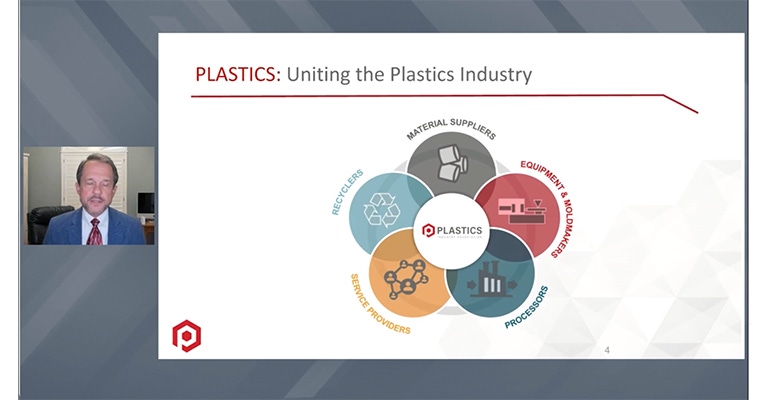At Virtual Engineering Days, Plastics Industry Association President and CEO Tony Radoszewski urged industry to "push back" against those who want to “put us out of business.”
June 18, 2021

Plastics Industry Association (PLASTICS) President and CEO Tony Radoszewski didn’t mince words during a presentation at Virtual Engineering Days this week. The plastics industry has a “target on its back,” he told attendees. “Some people are trying to put us out of business,” and industry has to push back with a “united voice,” he stressed. Radoszewski showed how on day one of the three-day virtual event. He was joined by PLASTICS Chief Economist Perc Pineda, who delivered an upbeat economic assessment of the industry in a post-pandemic landscape.
Preaching to the choir to some extent, Radoszewski highlighted the many ways that plastics benefit society. The litany is familiar to those of us who cover the industry, but it bears repeating that polymers enable medical breakthroughs and improve patient safety, increase fuel efficiency in automobiles through lightweighting, reduce food waste and make food last longer thanks to innovations in packaging, and help build a more durable, sustainable infrastructure. None of that seems to drown out the clarion call of NGOs and parts of the media to abolish plastics. Radoszewski acknowledged the dissonance — “We are part of the problem because there is so much plastic” — but, importantly, “we�’re also part of the solution.”
On that note, Radoszewski went down a long list of industry and association initiatives that are tackling the plastic waste problem head on. He mentioned advocacy on a state and federal level for programs to held fund the development of solid-waste recycling infrastructure programs. That involves plastics, “for sure,” he noted, “but really it’s more than a problem with plastics. There’s a problem with glass, metal, and paper.” That seems like an obvious point, but NGOs and environmental activists rarely take an inclusive posture in that debate, preferring to single out plastics as the culprit.
He also cited the use of post-consumer recycled products, especially for industrial applications and infrastructure projects. Radoszewski referenced the use of plastic pipes to durably deliver potable water to communities at an affordable price. PlasticsToday has covered several infrastructure projects, including roads paved with waste plastic, in a recent article.
While there are challenges surrounding the use of recycled content in food packaging because of issues related to sterility and cleanliness, “our industry is advancing technologies in recycling that give us the opportunity to take a product that was used and reuse it, perhaps in the same application where it was used initially,” said Radoszewski. As readers of PlasticsToday are well aware, industry is spending billions of dollars developing advanced recycling technologies that are moving us ever closer to a circular economy.
Creating value in plastic waste through recycling and reuse is a more practical solution than attempting to banish the material, or declare it toxic, as Canada has done. There’s a simple reason for the enduring global popularity of plastic. “Think of a world without plastics,” said Radoszewski. “If you use a cell phone for your alarm, you’re touching plastic the minute you wake up. And when you go to bed at night and you’re setting your alarm, you’re touching plastic again. It’s everywhere, and you know why? Because it’s pretty darn good.”
People by and large agree. As much of the world emerges from a pandemic pause in the global economy, demand for plastics will rise, said Pineda. He forecasts for this year a 4% increase in US resin production, 5.4% increase in plastics manufacturing, and 7.4% increase in plastics production machinery.
Plastic belongs in our lives, not in landfills, landscapes, or waterways, and Radoszewski and Pineda made a persuasive case for how industry is meeting both of those imperatives.
Virtual Engineering Days was organized by Informa Markets – Engineering, which also produces PlasticsToday. This session and dozens of others can now be viewed on demand for one month. Registered users can access the content by using the same login used to attend the live event. If you have not yet registered, you can do so here to gain on-demand access to the entire Virtual Engineering Days program.
About the Author(s)
You May Also Like




